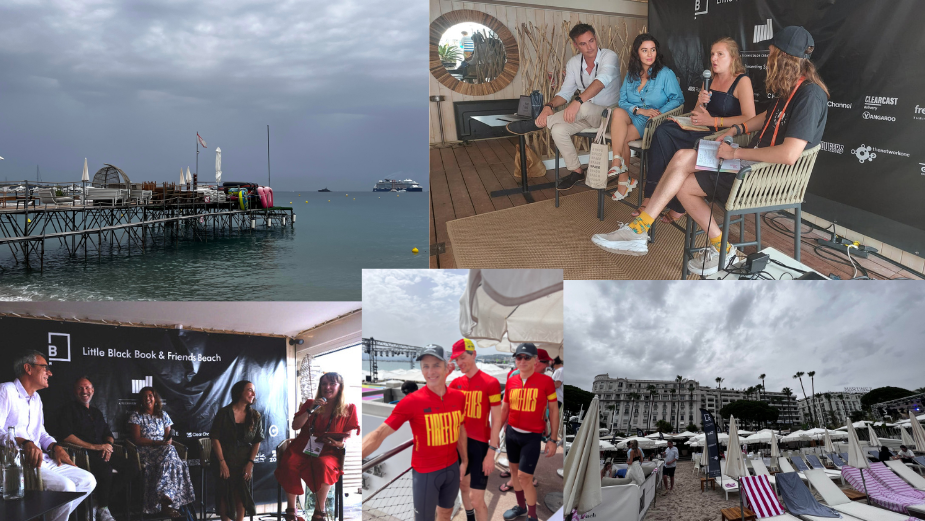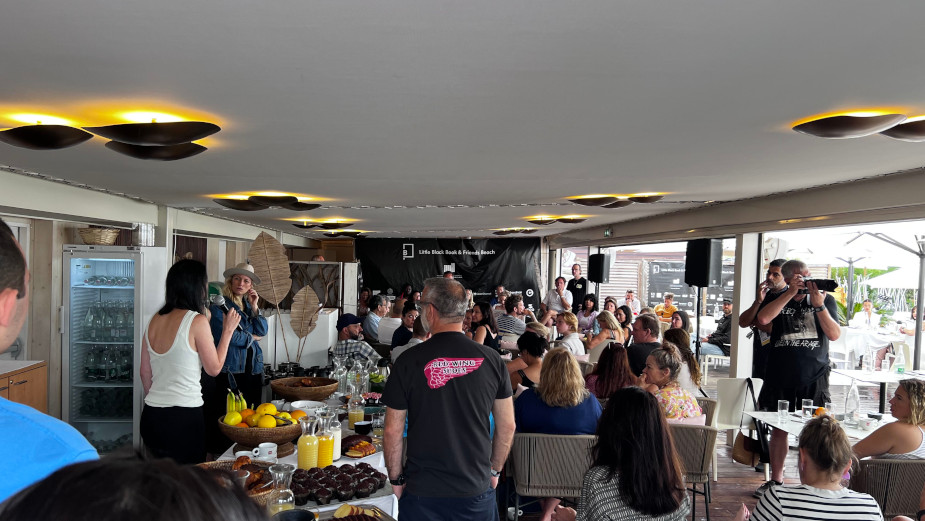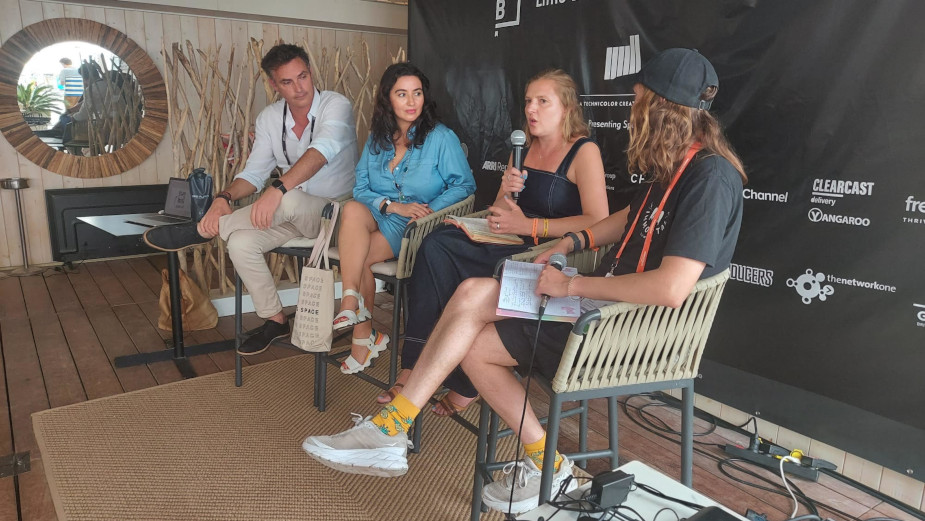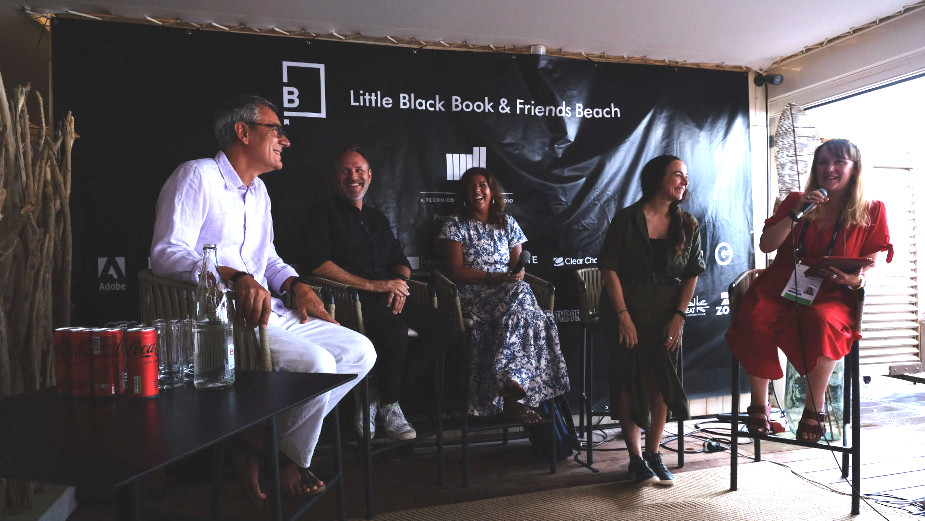
Grey Skies and Bright Ideas on LBB & Friends Beach Day 2

Day two at the LBB & Friends beach opened with a downpour on the Croisette but that couldn't dampen spirits at the World Producers Summit, which kicked off a lively schedule of events.
Hosted by the APA, AICP and CFP-e, the summit saw producers from all over the world meet to debate and discuss the pressing issues facing the industry, from diversity and sustainability to pitching. It was a packed event with nearly 100 producers in attendance - but also a closed event so we can't disclose exactly what went down.

[Pictured above: World Producers Summit]
Next up, LBB's Alex Reeves hosted a panel on sustainable production called For Offset’s Sake! We’re in this together!
It featured Carly Stone, founding partner/executive producer, Madam Films; Michael Kaliski, founder and CEO of Good Planet innovation/co-Founder and chairman, Green The Bid; Gloria Pitagorsky, managing partner, Heard City.

[Pictured above: For Offset’s Sake! We’re in this together! panel]
Carly Stone urged producers to measure their carbon impact and use data to educate clients. For example, on flights, there's even a difference in carbon footprint in flight times, with first class being 4x the carbon footprint of economy.
“This attitude of 'it's going there anyway’ won't fly”, added Michael Kaliski.
Virtual production stages were also flagged as a coming game changer that reduced flights and carbon footprints.
Around lunchtime, the LBB & Friends Beach took a leap into the Metaverse, as The Mill presented The Mill: Building a Wardrobe for the Metaverse.
Andrew Melchior EVP global director of brand experience at the Mill chaired a panel on the metaverse which brought together leading industry figures in the space: Katie Burke co-lead for the Metaverse Continuum, Accenture Song; Nick Pringle, SVP ECD, R/GA; Elav Horwitz. SVP global innovation & creative partnerships director at McCann Worldwide; Gareth Jones, SVP marketing, North America at Wunderman Thompson.
Recognising that the Metaverse is probably one of the most talked-about topics at Cannes this year, the panel started on a light note with Gareth Jones advising the audience at the LBB & Friends beach “not to trust anyone who calls themselves a metaverse expert”. Something R/GA’s Nick Pringle then humorously used to introduce himself at any opportunity. On a more serious note, there was a general consensus amongst all panellists that they are still very much in the exploratory and learning phase when it comes to the metaverse. Each panellist outlined various toolkits they had been building to educate their clients on how to create meaningful applications and strategies as well as basic teachings about the sector.
Mid-discussion Katie Burke reminds the audience and panel not just to think about “digital experiences” but the physical too.
Katie and Nick also argued that the metaverse will only really break into the mainstream when it ‘disappears’. Nick explains that “what people really care about is what tech enables, not what it is”. He says that successful technologies in the past are ones which we no longer notice in our day to day routine. And Katie agrees that the current friction of access to some experiences - VR / AR etc can often be the barrier to them becoming widely used. When we think about the metaverse hitting the mainstream - we need to think invisible.
The panel clashed heads on one issue posed by Andrew. Following a question around what types of content or topic matter will draw people into the metaverse, he asked if we should really consider the possibility that creative businesses are becoming more akin to those in the gaming industry - Katie Burke challenged the panel, arguing that gaming was not necessarily relevant for all.
She says, “Are we renaming the gaming industry the metaverse? Is that what we're doing? Because there are a lot of people that don't play games at this point that all of our brands and all of our clients still have to reach as well. Gaming is the original platform …but I do think that there's going to be a range of how people want to experience the metaverse. And so we can't just assume that everyone wants to gamify every part of their life. I truly don't believe that that's the case.”
Elav at McCann added to this, “It's not a technology. It's based on the idea. It's based on the stories, it's based on real people.”
Unsure if he was agreeing or disagreeing, Gareth Jones weighed in with the view that the key for companies is connection, which includes gaming, “storytelling is a way of connecting. Play is a way of connecting. Play releases dopamine, which makes you feel good about connecting and the more you can gamify that, the stronger connections and the better story you're going to be able to tell - ultimately being more successful for your brands.”
The panel rounded off with a final discussion on ethics and accessibility - something all panellists agreed needed to be outlined (and fast!) to keep people safe and protected as many begin to invest in this space.
In the afternoon things got spicy with a conversation about the client-agency relationship. A session called 'It's complicated' unpacked one of the crunchiest stories of this year's Super Bowl and used it as a platform to explore how the relationships between clients and partners can be more respectful.
The panel was moderated by LBB's Laura Swinton and featured: Kristen Cavallo, CEO, The Martin Agency; Jose Miguel Sokoloff, president, MullenLowe Global Creative Council; Patricia Corsi, global CMO, Bayer Consumer Health; Josh Mandel, president, The Mill.

[Pictured above: It's complicated' panel]
After the 2022 Super Bowl, Martin Agency CEO Kristen Cavallo infamously called out bad behaviour by a client over the idea behind one of the big game’s most popular ads. The company claimed the idea had been created in-house and showed the uselessness of agencies - only for Kristen to remark the idea had been created by her agency for the brand.
The ensuing panel was spontaneous and full of insight, and as the panellists discussed this issue - of relationships and credit - which sparked off sorts of actionable insights. Kristen revealed that since calling out one client, she had been approached by numerous clients wanting to be better - and rather than scaring clients off, the agency had won a number of new accounts with no pitching.
Patricia said that respectful, appreciative relationships didn't preclude hard conversations with agencies - though advised these should happen in small rooms, while Josh Mandel said that friction was where the creative magic happened. Creating space for honest and challenging conversations rather than avoiding them out of fear or apathy is a key part of a healthy working relationship.
In terms of inspiring takeaways, Kristen recommended that agencies should be able to interview clients during pitches to ensure cohesive values and visions while Patricia mentioned that one day pitches had been a revelation.
And it wasn't just about agencies and clients - Jose Miguel likened bringing ideas to life to gardening, with craftspeople and producers deserving credit for elevating and nurturing ideas with their own crafts, skills and perspectives.
The audience responded with whoops and cheers to many of the panellists' suggestions, showing an appetite for addressing those crunchy topics and frustrations that come up in our daily work.
With passions riled and brains buzzing, it was onto happy hour - by which time the rain had dried and skies had cleared.













